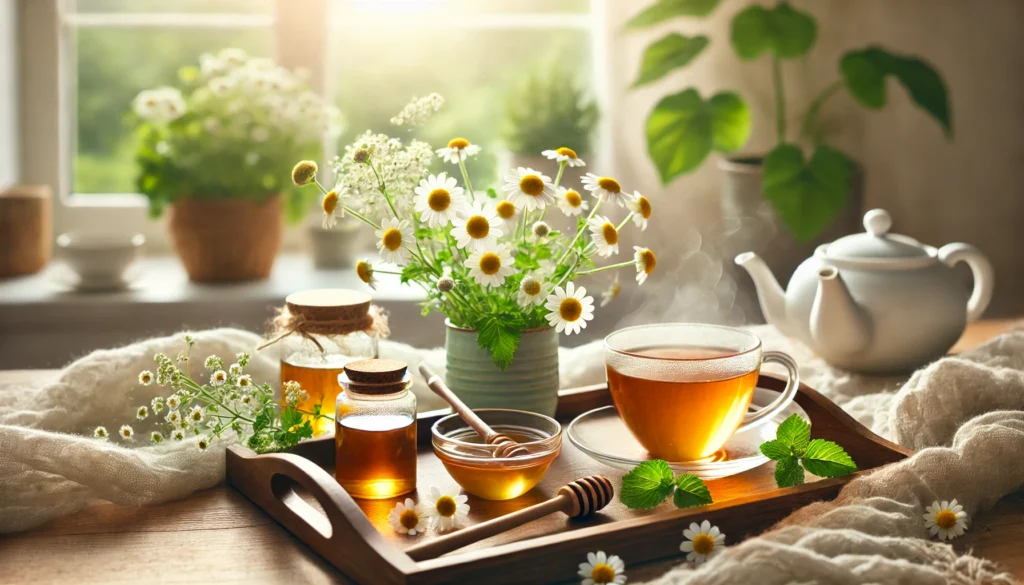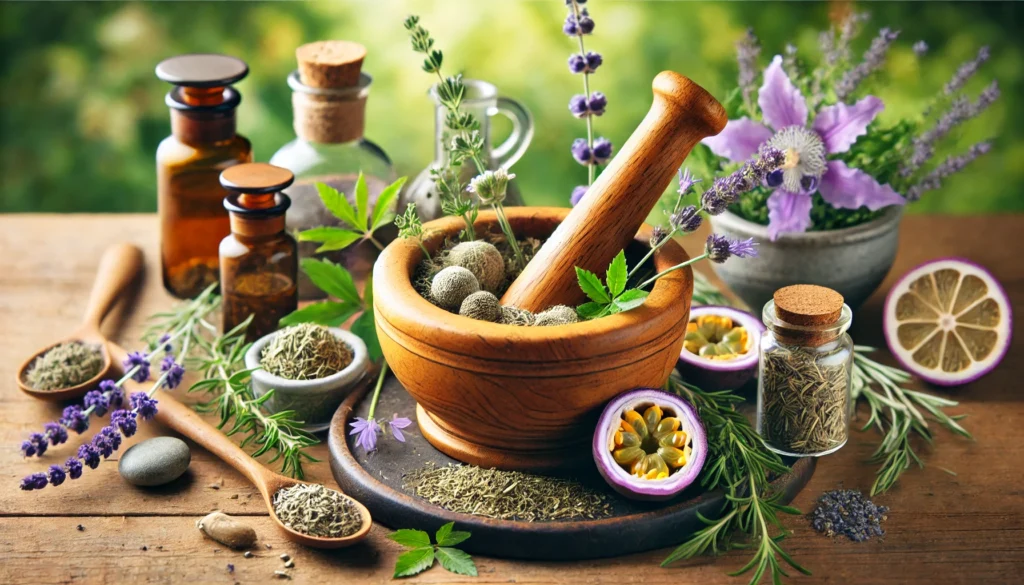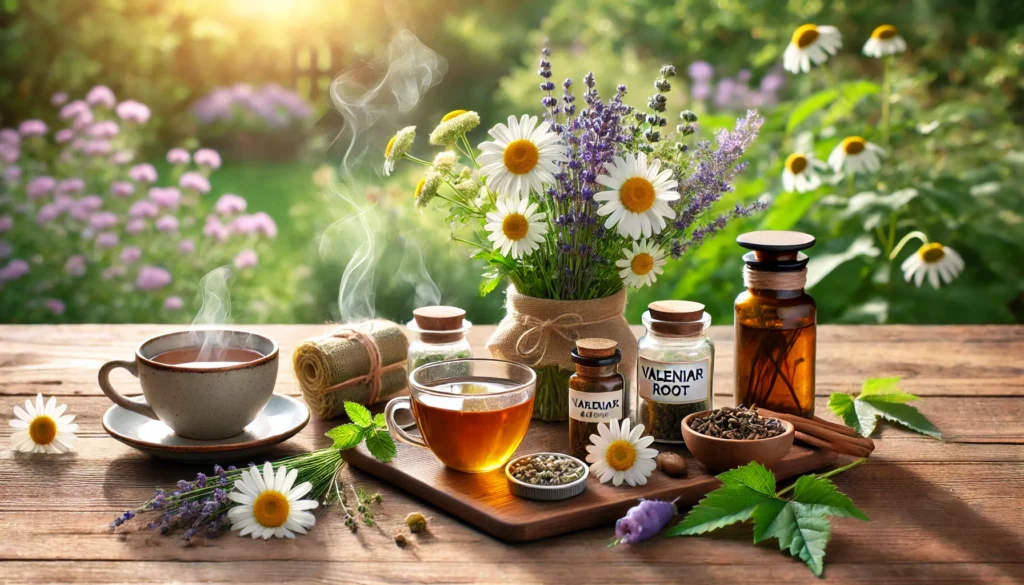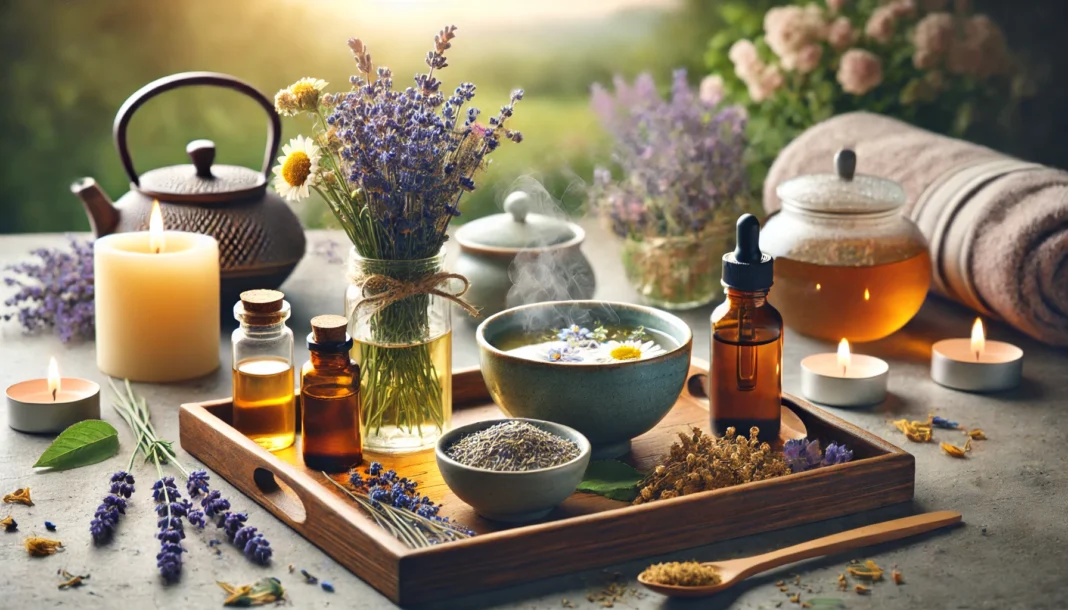Understanding Anxiety and the Role of Natural Remedies
Anxiety is one of the most prevalent mental health conditions worldwide, affecting millions of individuals who seek relief from chronic stress, nervousness, and persistent worry. While pharmaceutical interventions, such as antidepressants and benzodiazepines, are often prescribed by a dr for anxiety, an increasing number of people are turning to natural alternatives to complement their treatment. Many anxiety doctors acknowledge the potential benefits of herbal remedies in alleviating symptoms and promoting overall well-being.
You may also like: Best Herbal Alternatives to Anxiolytics: Natural Remedies for Anxiety Relief
The use of herbs for anxiety is rooted in centuries of traditional medicine. Ancient healing systems, including Ayurveda and Traditional Chinese Medicine, have long relied on plants to restore balance to the nervous system. Today, modern scientific research continues to explore how specific herbs influence neurotransmitters like serotonin, dopamine, and GABA, all of which play key roles in mood regulation. This growing body of evidence supports the efficacy of natural remedies, making them a valuable addition to conventional approaches recommended by an anxiety doctor.
Adaptogens: Nature’s Stress Relievers
Adaptogenic herbs are a class of botanicals known for their ability to help the body adapt to stress and restore equilibrium. These plants work by regulating cortisol levels, the hormone responsible for the body’s fight-or-flight response. High cortisol levels contribute to chronic stress and anxiety, making adaptogens a powerful tool in managing symptoms naturally.
Ashwagandha: The Ancient Calming Herb
Ashwagandha (Withania somnifera) is one of the most well-researched adaptogens for anxiety relief. Used in Ayurvedic medicine for over 3,000 years, this herb has been shown to lower cortisol levels and improve resilience to stress. Clinical studies suggest that individuals taking ashwagandha extract experience reduced anxiety, improved sleep quality, and enhanced cognitive function. A dr for anxiety may recommend ashwagandha as part of a holistic treatment plan for patients experiencing chronic stress and fatigue.
Rhodiola Rosea: The Energy and Mood Booster
Rhodiola rosea is another adaptogenic herb known for its ability to enhance mental clarity and alleviate fatigue. By supporting the body’s stress response system, Rhodiola helps balance neurotransmitter levels and promotes a sense of calm without causing drowsiness. Research suggests that it can be particularly beneficial for individuals experiencing anxiety-induced exhaustion. Many individuals seeking guidance from an anxiety doctor find Rhodiola to be a gentle yet effective supplement for managing symptoms.
Holy Basil: The Sacred Herb for Stress Reduction
Holy basil (Ocimum sanctum), also known as Tulsi, is revered in Ayurvedic medicine for its profound calming effects on the nervous system. This herb is known to regulate cortisol and support overall emotional well-being. Studies indicate that regular consumption of holy basil tea or extract can lead to significant improvements in mood and resilience against stress. Its ability to promote relaxation makes it a preferred choice for those looking for gentle, non-sedative herbal support.

Calming Herbs That Act on the Nervous System
Beyond adaptogens, several herbs exert direct effects on the nervous system, promoting relaxation and reducing anxiety symptoms. These botanicals influence neurotransmitters such as gamma-aminobutyric acid (GABA), which helps regulate nervous system excitability.
Valerian Root: Nature’s Tranquilizer
Valerian root (Valeriana officinalis) is widely recognized for its sedative properties and its ability to promote deep relaxation. This herb works by increasing GABA levels in the brain, helping to quiet racing thoughts and reduce nervous tension. While some drs for anxiety may caution against long-term use due to potential dependency concerns, short-term supplementation can be highly effective in easing acute anxiety episodes and improving sleep quality.
Passionflower: A Gentle Yet Powerful Relaxant
Passionflower (Passiflora incarnata) is another natural remedy commonly recommended by anxiety doctors for its calming effects. This herb has been shown to enhance GABA activity, reducing the intensity of anxiety symptoms. Studies suggest that passionflower may be as effective as certain prescription medications in alleviating generalized anxiety disorder (GAD), making it a viable option for those looking to avoid pharmaceutical interventions.
Lemon Balm: The Mood-Enhancing Herb
Lemon balm (Melissa officinalis) is a mild yet effective herbal remedy that has been used for centuries to promote relaxation. It has been shown to improve mood, enhance cognitive function, and reduce symptoms of stress-induced anxiety. Whether consumed as tea, tincture, or supplement, lemon balm is often recommended by anxiety doctors for individuals dealing with mild to moderate anxiety symptoms.

Integrating Herbal Remedies into a Holistic Anxiety Management Plan
While herbal remedies offer significant benefits, they work best when combined with lifestyle modifications and other holistic approaches. A comprehensive anxiety management plan should include:
- Mindfulness and Meditation: These practices help regulate the nervous system and enhance emotional resilience.
- Nutritional Support: A diet rich in omega-3 fatty acids, magnesium, and B vitamins can support neurotransmitter balance.
- Regular Exercise: Physical activity releases endorphins, reducing stress and improving mood.
- Adequate Sleep: Sleep is essential for emotional regulation, and herbs like valerian and passionflower can support better rest.
Consulting an anxiety doctor before starting any new herbal regimen is crucial, especially for individuals taking prescription medications. Some herbs can interact with pharmaceutical drugs, making professional guidance essential to ensure safety and effectiveness.
Frequently Asked Questions (FAQ) on Herbal Remedies for Anxiety
1. Can herbal remedies completely replace conventional anxiety treatments? Herbal remedies can be a valuable complement to conventional anxiety treatments, but they should not be viewed as a complete replacement, especially for individuals with severe anxiety disorders. An anxiety doctor often recommends an integrative approach that combines lifestyle changes, therapy, and, in some cases, prescription medications. While some individuals find that herbal treatments effectively alleviate mild to moderate anxiety, others may require additional medical interventions. It is important to consult a dr for anxiety before making any changes to treatment plans, particularly for those already taking medication. A professional can help determine the best course of action tailored to individual needs.
2. How long does it take for herbal remedies to work for anxiety? The effectiveness of herbal remedies varies depending on the individual, the specific herb used, and the severity of symptoms. Some herbs, like valerian root and passionflower, have immediate calming effects, while others, such as ashwagandha and Rhodiola rosea, require consistent use over several weeks to produce noticeable results. A dr for anxiety may advise patients to track their symptoms and monitor progress over time. Unlike prescription medications that act quickly, natural treatments often work gradually, supporting long-term balance rather than offering instant relief. Patience and consistency are key when using herbal solutions for anxiety management.
3. Are there any potential interactions between herbal remedies and prescription anxiety medications? Yes, certain herbs can interact with prescription medications, altering their effectiveness or causing unwanted side effects. For example, St. John’s Wort can interfere with antidepressants, while valerian root may enhance the sedative effects of benzodiazepines. An anxiety doctor can provide guidance on safe herbal options based on an individual’s specific medical history. It is crucial to disclose all supplements being taken to avoid potential complications. A dr for anxiety may suggest alternative herbal remedies that do not conflict with existing treatments.
4. Which herbal remedies are best for social anxiety? Social anxiety can be particularly challenging, but several herbal remedies may help improve symptoms. Adaptogens like Rhodiola rosea can enhance resilience to stress, while lemon balm has been shown to promote a sense of calmness in social settings. Passionflower is also known for its ability to reduce nervous tension without causing drowsiness. Many individuals consult an anxiety doctor to determine which natural solutions best suit their specific type of anxiety. In some cases, a dr for anxiety may recommend combining herbal supplements with therapy or mindfulness techniques for a more comprehensive approach.
5. Can herbal remedies be used for anxiety-related sleep disturbances? Yes, several herbs are particularly effective in addressing anxiety-related sleep disturbances. Valerian root is well-known for its sedative effects, while chamomile and lavender promote relaxation and improve sleep quality. Lemon balm has been found to reduce restlessness and encourage deeper sleep. Many individuals experiencing insomnia due to anxiety consult a dr for anxiety to find the best herbal solutions for their needs. An anxiety doctor may suggest combining herbal remedies with good sleep hygiene practices to optimize results.
6. Are herbal remedies safe for long-term use? Most herbal remedies are considered safe for long-term use when taken appropriately. However, some herbs, like kava and valerian root, may require periodic breaks to prevent potential dependency or tolerance. A dr for anxiety can provide personalized recommendations on safe dosages and appropriate usage schedules. Regular monitoring ensures that the body continues to respond positively to the herbs without developing adverse effects. Consulting an anxiety doctor before committing to long-term herbal treatment is always advisable.
7. What lifestyle changes enhance the effectiveness of herbal anxiety treatments? While herbal remedies can be powerful tools for managing anxiety, their effectiveness is enhanced when combined with positive lifestyle habits. Regular exercise, a balanced diet rich in omega-3 fatty acids, and mindfulness practices like meditation can significantly improve mental well-being. Many individuals working with an anxiety doctor find that incorporating yoga or breathwork into their routine further reduces symptoms. A dr for anxiety may recommend holistic strategies tailored to an individual’s unique circumstances. Making sustainable changes creates a well-rounded approach to anxiety management.
8. Are there any specific dietary considerations when taking herbal anxiety remedies? Some foods and beverages can enhance or interfere with the effects of herbal anxiety remedies. For example, caffeine may counteract the calming effects of herbs like valerian and passionflower, while foods rich in magnesium and B vitamins support the nervous system. An anxiety doctor may advise reducing sugar and processed foods to stabilize mood fluctuations. Certain herbs, like St. John’s Wort, can interact with specific foods, making dietary awareness crucial. Consulting a dr for anxiety can provide valuable guidance on optimizing diet to complement herbal treatments.
9. Are herbal remedies suitable for children and teenagers with anxiety? Herbal remedies can be beneficial for children and teenagers experiencing anxiety, but proper guidance is essential. Some herbs, like chamomile and lemon balm, are generally considered safe for younger individuals, while others, such as kava, should be avoided. A dr for anxiety specializing in pediatric care can recommend the safest and most effective herbal options for younger patients. Dosage and formulation are important factors, as children may require different concentrations than adults. Parents should always consult an anxiety doctor before introducing herbal treatments to ensure safety and effectiveness.
10. How can I find high-quality herbal supplements for anxiety? The quality of herbal supplements can vary widely depending on the brand and manufacturing process. It is essential to choose products that are third-party tested for purity and potency. An anxiety doctor may recommend reputable brands known for rigorous quality control standards. Reading labels for standardized extracts and avoiding artificial additives can help ensure the effectiveness of the supplement. A dr for anxiety can also guide individuals on appropriate dosages and formulations that align with their specific health needs. Conducting research and consulting professionals can lead to safer and more effective herbal choices.

Conclusion: Harnessing the Power of Nature for Anxiety Relief
The growing interest in herbal remedies for anxiety reflects a broader movement toward natural, holistic wellness. While conventional treatments remain essential for many, natural options provide a complementary approach that aligns with the body’s inherent healing abilities. As more research emerges, the integration of herbal solutions into mental health care continues to gain recognition.
By understanding the science behind these herbs and incorporating them into a well-rounded wellness routine, individuals can take proactive steps toward managing anxiety naturally. Consulting with an anxiety doctor or a holistic practitioner ensures that these remedies are used safely and effectively, empowering individuals to find lasting relief from stress and worry through nature’s own pharmacy.
natural anxiety relief, herbal supplements for stress, calming herbs for nervous system, adaptogenic herbs for stress, holistic mental health remedies, plant-based anxiety support, best herbs for relaxation, stress-reducing botanicals, herbal anxiety treatment, alternative medicine for anxiety, natural GABA boosters, mood-enhancing herbs, traditional medicine for stress, botanical solutions for anxiety, herbal sleep aids, holistic approaches to anxiety, nervous system support herbs, natural cortisol regulation, anxiety-reducing teas, mind-body wellness herbs
Further Reading:
10 Natural Ways to Reduce Anxiety
Herbal treatment for anxiety: Is it effective?
How to treat anxiety naturally
Disclaimer
The information contained in this article is provided for general informational purposes only and is not intended to serve as medical, legal, or professional advice. While NewsHealthWatch strives to present accurate, up-to-date, and reliable content, no warranty or guarantee, expressed or implied, is made regarding the completeness, accuracy, or adequacy of the information provided. Readers are strongly advised to seek the guidance of a qualified healthcare provider or other relevant professionals before acting on any information contained in this article. NewsHealthWatch, its authors, editors, and contributors expressly disclaim any liability for any damages, losses, or consequences arising directly or indirectly from the use, interpretation, or reliance on any information presented herein. The views and opinions expressed in this article are those of the author(s) and do not necessarily reflect the official policies or positions of NewsHealthWatch.

